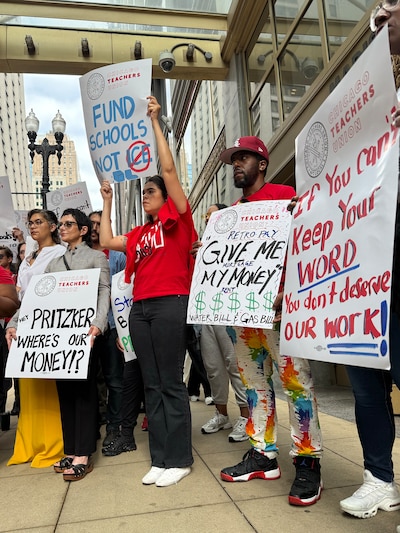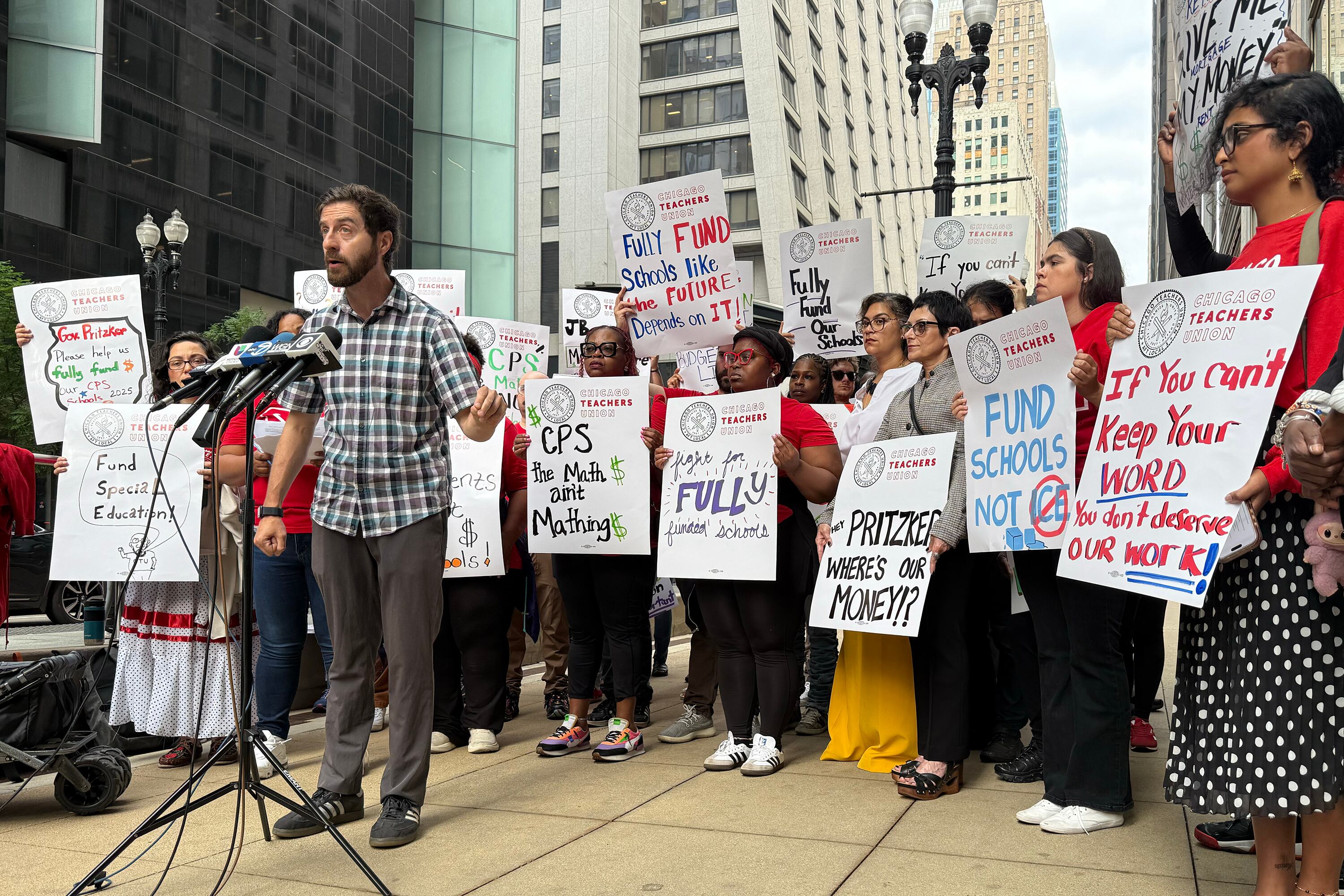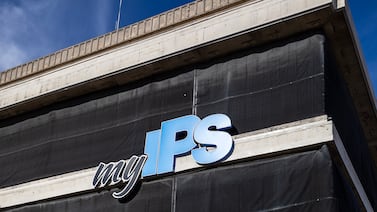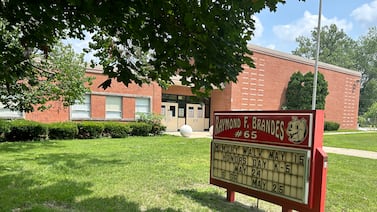Sign up for Chalkbeat Chicago’s free daily newsletter to keep up with the latest education news.
Chicago Public Schools is struggling to pay some of its bills and is facing increasing pressure to avoid layoffs as it searches for ways to close a $734 million deficit.
The district’s budget challenges are the most severe in at least the past five years and have already resulted in dozens of layoffs of central office staff and crossing guards. Officials said previously that school-based layoffs would happen in July and teachers union leaders are demanding retroactive raises be sent out as soon as possible.
This year’s budget will be the first approved by the city’s new partially elected school board.
District leaders must find a way to close the deficit either by finding more revenue, making more cuts, or borrowing money. Their plan must be approved by the 21-member Board of Education, which met Wednesday to hold an hourslong closed session and review its agenda for its full board meeting later this month.
The new fiscal year is underway, but the district isn’t expected to finalize a budget until Aug. 28. By state law, Chicago’s school board can approve a budget as late as the end of August.
So far, CPS has closed just over one-fifth of the budget gap through various cuts, including through layoffs and reductions in some contractual costs, budget director Mike Sitkowski told the board on Wednesday. Big pressures on the budget include rising costs for students with disabilities, who are legally entitled to additional support, and the cost of maintaining aging buildings, he said.
By 2030, the district’s deficit could be $1.3 billion unless the district finds more permanent, long-term revenue, Sitkowski said.
CPS’s budget gap this year could grow after the Trump administration announced last week it would withhold and reevaluate some streams of federal funding, which amount to about $60 million for CPS, Sitkowski said.
Board members asked several questions, including whether they need to factor in a much-debated $175 million pension payment to the city, which is not required by state law, and whether there is wasteful spending that the district could curb to avoid cuts. Though the district’s budget challenges have been shared with the board for months, multiple board members said they’re feeling unprepared.
Interim CPS CEO Macquline King said the district will hold five meetings from July 14 to July 21 to collect public feedback on how CPS should close its budget gap.
In a statement to families earlier this week, King said CPS is “currently working with state and local partners to maximize opportunities for additional revenue, including Tax-Increment Financing (TIF) surplus funds.”
CTU pushes for state legislative session to address funding
During a rally Wednesday outside Board of Education headquarters, Chicago Teachers Union Vice President Jackson Potter called on CPS to avoid staff layoffs. Potter pushed for more funding, including from new state taxes and a city pool of tax dollars known as Tax Increment Financing, or TIF.
A private district presentation to board members in April offered one scenario: With a deficit of $734 million, CPS could cut 10% of funding that goes directly to schools. That April presentation also suggested that in order to close a smaller $529 million deficit, CPS would need to eliminate 1,600 school-based positions.
The current deficit figure includes the pension reimbursement to the city. It also does not assume that CPS will get roughly $600 million in TIF surplus dollars — something Martinez pushed for before his departure.
Mayor Brandon Johnson provided CPS with a record-high of roughly $300 million in TIF surplus dollars last fiscal year, and some observers have described the push for more as wishful thinking.
Service Employees International Union 73, or SEIU, which represents school support staff, and CTU have also called on more TIF funding, but teachers union leaders have also supported borrowing money and finding new revenue to pay it off.
Some school board members view borrowing as a short-term avenue to avoid painful cuts at schools, while others worry about high-interest debt repayments that will take money away from classrooms.
At its rally Wednesday, the teachers union demanded that Gov. J.B. Pritzker call a special legislative session in order to allocate more state funding to education funding in light of potential federal funding cuts. Several states, including New Mexico and Colorado, are considering calling special sessions in response to President Donald Trump’s tax bill that imposes cuts to social safety net programs.

The state created a new funding formula in 2017 that provides more money to all districts across the state, but prioritizes additional dollars to those with higher needs. Illinois lawmakers set a goal to fully fund all districts by 2027, but projections indicate they won’t make that deadline.
The state has typically provided an annual increase of $350 million in funding for all Illinois districts — though this year, that increase was $307 million. Since 2017, Illinois has increased what it spends on K-12 education by more than $2 billion, and in that time, state funding for CPS has increased by $1.1 billion. However, the formula says CPS is still $1.2 billion short of what’s considered adequate.
On Tuesday, Alex Gough, a spokesperson for Pritzker’s office, referred Chalkbeat to a statement last year from Pritzker saying he’d like to fund education more — and noted that the state hasn’t yet fully funded its own formula — but said, “Now the question is, where do you find the dollars to do that?”
On Wednesday afternoon, Pritzker’s office issued a news release that called Trump’s budget bill “destructive” and a “major setback for students across the nation.”
“Here in Illinois, we’ll do everything in our power to protect the public education systems we’ve worked so hard to improve and continue supporting students in every way we can,” Pritzker said in a statement.
Union officials said Pritzker should consider various revenue-raising strategies, including new taxes on capital gains and digital advertising.
“For the governor to say we’ve done everything we can is patently false,” Potter said. “We need to do more — that is their own commitment.”
Gough declined to comment when asked if Pritzker is considering calling a special session.
CPS could delay retroactive pay raises for union members
Separately, Potter also said CPS must pay the union’s members retroactive pay they’re owed after getting a new contract, noting that the district said it could afford those raises when it settled its new contract with CTU.
WBEZ first reported this week that the district may not have enough cash on hand until the fall to pay CTU members retroactive raises stemming back to last July, when their contract expired. The $100 million price tag represents the annual 4% raises included in the new contract, which was finalized this May.
Sitkowski told WBEZ that CPS will get a second tranche of property tax revenue from Cook County in the fall. CPS did not respond to Chalkbeat’s questions about the retroactive pay issue.
The district typically provides retroactive pay “when payroll has the tax receipts to enable the payment,” Potter said. Absent those county tax dollars, Potter said all emergency funding “options need to be on the table” in order to pay CTU members in a “timely manner.”
Reema Amin is a reporter covering Chicago Public Schools. Contact Reema at ramin@chalkbeat.org.






